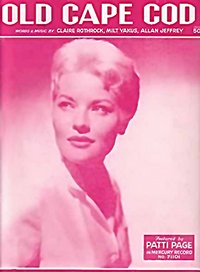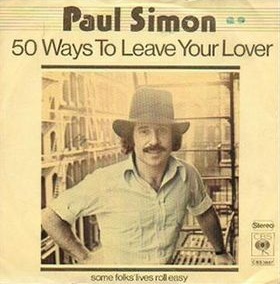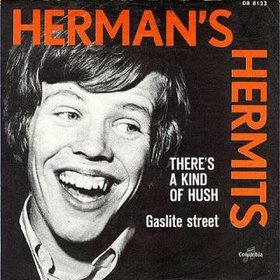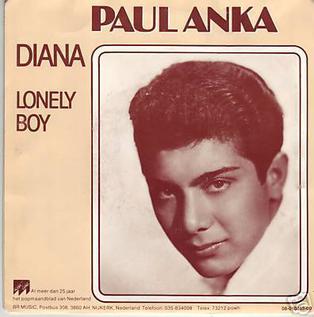Related Research Articles

Clara Ann Fowler, known professionally as Patti Page, was an American singer and actress. Primarily known for pop and country music, she was the top-charting female vocalist and best-selling female artist of the 1950s, selling over 100 million records during a six-decade-long career. She was often introduced as "the Singin' Rage, Miss Patti Page". New York WNEW disc-jockey William B. Williams introduced her as "A Page in my life called Patti".
The Billboard Hot 100 is the music industry standard record chart in the United States for songs, published weekly by Billboard magazine. Chart rankings are based on sales, radio play, and online streaming in the United States.

"Earth Angel", occasionally referred to as "Earth Angel ", is a song by American doo-wop group the Penguins. Produced by Dootsie Williams, it was released as their debut single in October 1954 on Dootone Records. The Penguins had formed the year prior and recorded the song as a demo in a garage in South Central Los Angeles. The song's origins lie in multiple different sources, among them songs by Jesse Belvin, Patti Page, and the Hollywood Flames. Its authorship was the subject of a bitter legal dispute with Williams in the years following its release.
"Let Me Go, Lover!", a popular song, was written by Jenny Lou Carson and Al Hill, a pen name used by Fred Wise, Kathleen Twomey, and Ben Weisman. It is based on an earlier song called "Let Me Go, Devil", about alcoholism.
"It's Almost Tomorrow" is a 1955 popular song with music by Gene Adkinson and lyrics by Wade Buff. The song was actually written in 1953, when Adkinson and Buff were in high school. Hit versions were released in 1955 by The Dream Weavers, Jo Stafford, David Carroll, and Snooky Lanson.
Allegheny Moon is a popular song written by Al Hoffman and Dick Manning and published in 1956.

"Old Cape Cod" is a song written by Claire Rothrock, Milton Yakus and Allan Jeffrey that was published in 1957. The single, as recorded by Patti Page, became a gold record, having sold more than a million copies. Hailed by Cape Cod natives as the "unofficial Cape Cod Anthem, if ever there was one," the song has been credited with "putting the Cape on the map" and helping to establish Cape Cod as a major tourist destination.
"Croce di Oro" " is a popular song, written by James "Kim" Gannon.

"50 Ways to Leave Your Lover" is a song by the American singer-songwriter Paul Simon. It was the second single from his fourth studio album, Still Crazy After All These Years (1975), released on Columbia Records. Backing vocals on the single were performed by Patti Austin, Valerie Simpson, and Phoebe Snow. The song features a recognizable repeated drum riff performed by drummer Steve Gadd.

Hot Country Songs is a chart published weekly by Billboard magazine in the United States.

"There's a Kind of Hush" is a popular song written by Les Reed and Geoff Stephens. Originally recorded by Stephens' group the New Vaudeville Band in 1967 as a neo-British music hall number, this version of the track became a hit in Australia and South Africa. However, in the rest of the world, a near-simultaneous cover was a big hit for Herman's Hermits. The song was a charted hit again in 1976 for The Carpenters.

"Diana" is a song written and first performed by Paul Anka, who recorded it in May 1957 at Don Costa studio in New York City. Anka stated in his autobiography that the song was inspired by a girl named Diana Ayoub, whom he had met at his church and community events, and had developed a crush on. Session musicians on the record included Bucky Pizzarelli on guitar, Irving Wexler on piano, Jerry Bruno on bass, and Panama Francis on drums. The song was recorded in May 1957 at RCA Studios in New York. Backup singers included Artie Ripp.

Canadian singer Celine Dion has released 137 singles in both English and French discography as a lead artist. According to Billboard, Dion is the world's best-selling contemporary female artist of all time. Throughout her career, she has released a string of worldwide hits, with "My Heart Will Go On" being her career's biggest hit, with estimated physical sales of over 18 million worldwide, making it the 2nd best-selling physical single by a woman in history. It reached over 117 million radio impressions during its peak, becoming the most-played radio hit in history and became the best-selling single of 1998 worldwide. "Because You Loved Me" is her biggest hit on Billboard Hot 100, spending six weeks atop the charts and sold six million copies in its first six months of availability worldwide. "Pour que tu m'aimes encore" was the 4th biggest hit of the 1990s in France and has sold over four million copies worldwide.
"Hush, Hush, Sweet Charlotte" is a popular song with music by Frank De Vol and lyrics by Mack David, introduced in the 1964 film Hush...Hush, Sweet Charlotte starring Bette Davis. The song's title appears with varying punctuation in its different versions: this article indicates how each specific version styled the title.

I'm In Love Again is the sixth studio album by American singer Patti LaBelle in 1983. It was released by Philadelphia International Records and Sony Music Entertainment on November 25, 1983 in the United States. LaBelle's commercial breakthrough, it featured her first top ten R&B hits, "Love, Need and Want You" and "If Only You Knew", the latter topping the R&B chart in early 1984. It was later certified gold for selling half a million copies and paved the way for her pop breakthrough in late 1984 with the dance hit "New Attitude".
"Little Green Apples" is a song written by Bobby Russell. Originally written for and released by American recording artist Roger Miller in 1968, it was also released as a single by American recording artists Patti Page and O. C. Smith in separate occasions that same year. Miller's version became a Top 40 hit on the Billboard Hot 100 chart and on the UK Singles Chart, while Page's version became her last Hot 100 entry and Smith's version became a No. 2 hit on the Billboard Hot 100 chart. The song earned Russell two Grammy Awards for Song of the Year and Best Country Song. In 2013, "Little Green Apples" was covered by English recording artist Robbie Williams featuring American recording artist Kelly Clarkson, which became a top 40 hit in Mexico.
"Rose Garden" is a song written in 1967 by American singer-songwriter Joe South. It was first recorded by Billy Joe Royal on his 1967 studio album Billy Joe Royal Featuring "Hush". Versions by South himself and Dobie Gray appeared shortly after the original. Gray's version became a minor hit in North America in 1969.
"Long Lonely Nights" is a song that was originally released by Lee Andrews & the Hearts in 1957. Hit versions were also released by Clyde McPhatter, later in 1957, and Bobby Vinton in 1965. The song was written by Lee Andrews, though Larry Brown, Doug Henderson, and Mimi Uniman were given songwriter credit as well, in a practice that was common at the time.
References
- ↑ "Most Played by Jockeys". Billboard. Vol. 70 no. 26. 30 June 1958. p. 28. Retrieved 25 April 2020.
- ↑ Whitburn, Joel (2010). The Billboard Book of Top 40 Hits (9th ed.). New York: Billboard Books. p. 495. ISBN 9780823085545 . Retrieved 25 April 2020.
- ↑ "Patti Page Chart History (Hot 100)". Billboard. Retrieved 25 April 2020.